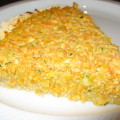
What have you heard about coconut oil? Is it mostly positive or negative? Here are some of the claimed benefits I’ve come across in my research (and I’m sure there’s even more).

Positive Benefits
Reverses Effects of Alzheimer’s + Increases Metabolism+ Improves Hypothyroidism + Aids Weight Loss + Cure Ulcers + Great Mouth Wash + Sustained Energy for Endurance Athletes + Heals Various Skin Problems + Replaces Hair Conditioner + The Best Skin Moisturizer + Improves Diabetic Conditions + Reduces Heart Burn and Acid Reflux + Alleviates Acne
Negative Claims from the Other Side
Extremely High in Saturated Fat…therefore, will cause Heart Disease + High Fat Content causes Weight Gain + Ingesting Causes Nausea and Vomiting + Just Another Fad Diet
Rather than getting into the validity of each claim, I’ll cover some of the nutritional properties and the peer reviewed studies that either back up or negate some of the above health claims.
Origins and Production
Coconut oil is an edible oil extracted from the kernel or meat of matured coconuts harvested from the coconut palm (Cocos nucifera). Extracting the oil from coconut meat, milk or residue is a time-consuming processing when done correctly. Producing it from the fresh meat involves removing the shell and washing, then either wet-milling or drying the residue and using a screw press to extract the oil. The oil can also be extracted from fresh meat by grating and drying it to a moisture content of 10-12%, then using a manual press to extract the oil. Producing it from coconut milk involves grating the coconut and mixing it with water, then squeezing out the oil. The milk can also be fermented for 36–48 hours, the oil removed, and the cream heated to remove any remaining oil. A third option involves using a centrifuge to separate the oil from the other liquids. Coconut oil can also be extracted from the dry residue left over from the production of coconut milk.
Saturated Fat
Coconut and Palm Oils are the only two known sources of plant-based edible saturated fat. For the last several decades these two fats have been grouped together with animal fat as heart killers. But this is old news. A meta-analysis of prospective cohort studies evaluating the association of saturated fat with cardiovascular disease does not support the notion that saturated fats increase the risk of coronary heart disease, stroke, or peripheral vascular disease. It turns out that the real culprits is very likely trans fat and hydrogenated fats and maybe even an overabundance of carbohydrate, which replaced moderate to high fat daily consumption back in the 1970’s. In fact, saturated fat is essential to maintaining a healthy body. Not only do we need it for energy, hormone production, cellular membranes and organ padding but we also need it for important signaling and stabilization processes in the body. According to Dr. Mary G. Enig, a leading voice in debunking low-fat diet regimens suggests that 25% of our daily fat intake come from saturated fat. See below for links to the research she’s done.
Medium-Chain Triglycerides
The vast majority of fats in our diet are composed of molecules known as long-chain triglycerides (LCT). As the name implies, LCT are larger in size than medium-chain triglycerides (MCT). The size of the fat molecule is very important because our bodies process and metabolize fats differently depending on their size. Most all the vegetable oils used in cooking and food preparation are composed entirely of LCT. This includes corn, safflower, soybean, canola, and other typical cooking and salad oils. The only significant natural source of MCT’s can be found in coconut and palm kernel oils. Coconut oil is composed predominately of MCT and its effects on the body are characterized by these fats.
In a recent study published in the Journal of Nutrition researchers reviewed all the published studies to date on MCT and weight management. These studies demonstrated that diets containing MCT result in an increase in energy, a rise in metabolism, increase burning of calories, decrease in food consumption, lower body fat mass, and reduce body weight. Because of these effects, the authors of this study recommend using oils containing MCT, such as coconut oil, as a means to lose excess body fat, control weight, and even treat obesity. On a different note, it has been shown that consuming foods rich in fat at the beginning of the day leads to less eating over a 24-hour period, which means total calorie consumption is also less. That’s why some professionals encourage their clients to eat a high-fat 100-calorie snack an hour before mealtime.
Medium-chain triglycerides in coconut oil are smaller than other fats and, therefore, digest very quickly, so quickly in fact, that the body uses them as an immediate source of fuel rather than pack them away in storage inside our fat cells. MCT’s are used to produce energy much like carbohydrates and, therefore, they do not circulate in the bloodstream like other fats. For this reason, they do not supply fat to fat cells or contribute to weight gain. This is why it might be a good energy source for physical activity. Incidentally, some people report nausea and vomiting when ingesting pure coconut oil, especially on an empty stomach.
(For a helpful demonstration on MCT’s and digestion, take a look at this excerpt from a Dr. Oz show on YouTube: https://www.youtube.com/watch?v=HiAQkg51AfA&feature=relmfu).
Lauric and Myristic Acid
Both of these fatty acids are very important for bodily process and yet most Westerners consume very little of them because we’ve been told to avoid them for better health. Myristic Acid found only in coconut oil (or FYI, the fat from dairy products) is used by the body to stabilize many different proteins, including proteins used in the immune system and to fight tumors. Lauric Acid, found in coconut oil and human milk, has several fascinating functions because of its anti-microbial properties. There are hundreds of studies on the benefits of using coconut oil topically to heal various skin conditions as well as the benefits of ingesting it to treat ulcers, acid reflux, HIV, as a germ-killing, teeth-cleansing mouthwash, etc.
Final Comments/Suggestions
If you’re going to purchase coconut oil (whether for topical use or ingestion), only buy pure organic extra-virgin (EVCO). Other sources oftentimes use partially hydrogenated fats.
I do not advocate that anyone go on a “Coconut Oil Diet” mainly because “diets” don’t work, especially when they’re extreme short-term efforts and it’s never a good idea to look at one particular food source as miraculous and the answer to all your weight issues. But I also recognize that the research is sound regarding MCT’s and that EVCO is a better choice over other vegetable oils. I also think Vegans needs to pay particular attention to making sure they have some saturated fat regularly for overall health and since plant sources are limited that means coconuts are a good thing to incorporate. It’s not a big deal to add a little to a smoothie or to cook with it in place of olive oil. For those of you who dislike coconut flavor, EVCO is virtually tasteless. On the other hand, if you love coconut flavor, here’s a smoothie recipe you might enjoy
Refreshing Coconut Smoothie
4 ounce drinking water
4 ounce raw, soaked almonds
Frozen banana
1 tablespoon coconut oil
1 tablespoon fresh coconut meat, unsweetened
½-1 cup fresh pineapple
4 ice cubes
Blend everything until smooth. Enjoy immediately!
The most comprehensive website I found to research the latest anecdotal and peer-reviewed studies on every single claim out there is www.coconutoil.com I would encourage you to go here first for additional reading into particular issues.
by Melissa Sanborn of Nutritional Brands, PureVegan
Resources
- The Importance of Saturated Fats for Biological Functions by Dr. Mary G. Enig. July 2004. http://www.westonaprice.org
- http://www.lauric.org/sources.html
- Coconut Oil Offers Hope For Antibiotic Resistant Germs by Brian and Marianita Shilhavy. http://coconutoil.com/coconut-oil-offers-hope-for-antibiotic-resistant-germs/
- Modern Coconut Management: Palm Cultivation and Products http://coconutoil.com/coconut-oil-offers-hope-for-antibiotic-resistant-germs/
- The Fat That Can Make You Thin by Bruce Fife, N.D. http://www.coconutresearchcenter.org/article10065.htm
- http://www.coconutoil.com





5 Comments
Chia (324 comments)
June 21, 2012 at 12:49 amI am a big fan of coconut, coconut oil, and coconut butter. A nutritionist friend had introduced coconut to me some years back, and since I’ve been using it almost daily. I put coconut nut oil over steamed rice and veggies and sometimes on toast. YUM.
On hot days, my family drinks fresh coconut water straight from the coconut (bought from markets). In the US, the coconuts are imports from Thailand and Philippines, though Brazil also exports coconut.
The best fresh coconut (with water) I’ve had was in Vietnam. So cheap, sweet, and cooling. The coconut (with water) I had in Thailand were good, too.
Chia (324 comments)
June 21, 2012 at 12:51 amI forgot to mention that virgin coconut oil is good for the skin, too. Just apply it directly onto skin. Though you do smell like the oil.
Be sure to buy jar coconut oil that is white and NOT yellow. Buy the best grade always (more expensive but worth it).
matthew.lovitt (1 comments)
June 21, 2012 at 4:58 amAwesome article! Its nice finding an objective piece that goes a little further to explain the science behind MCT’s and the benefits of plant based saturated fats. I hesitate to share, but this is my secret to running long. A little coconut oil goes a long way in helping me get through a grueling workout. Thanks for all your work on this!
Dia (1 comments)
June 21, 2012 at 1:33 pmThank you so much for this information. It answers questions I’ve had lately after seeing coconut oil mentioned often.
I’ve been confidently, enjoyably drinking coconut water for a few months now but knowing the oil is not the scary thing we’ve been told is good news.
veganvic (1 comments)
June 29, 2012 at 11:52 amThank you for this insight. If used for sauteing will coconut oil still give me its beneficial effects .